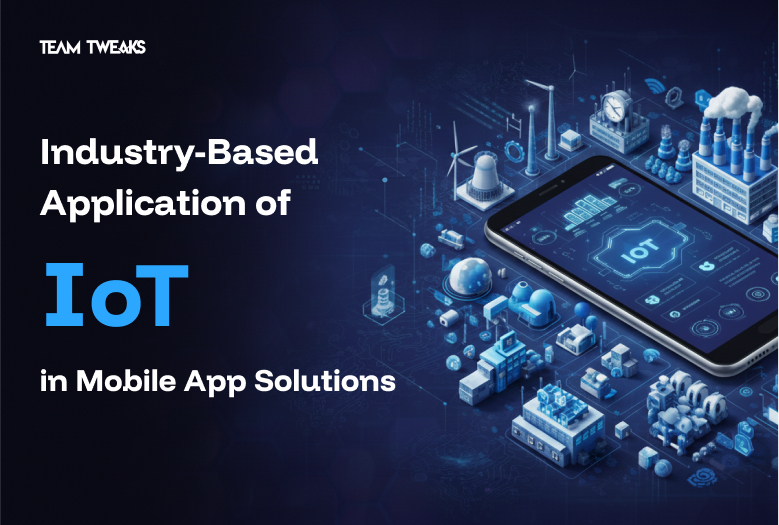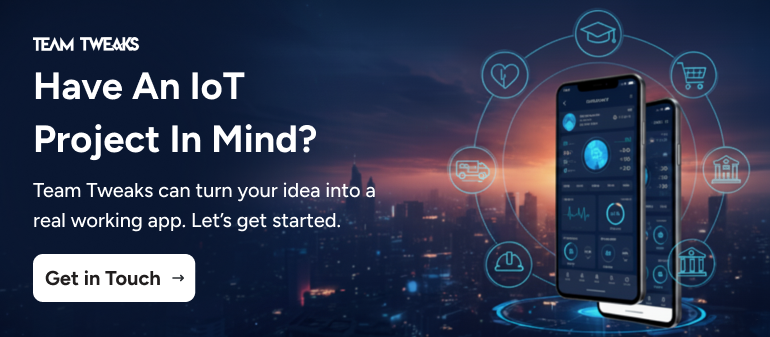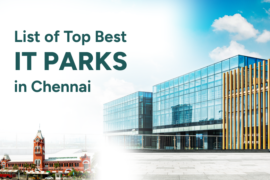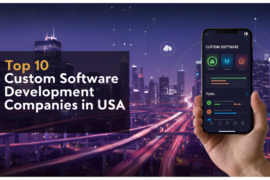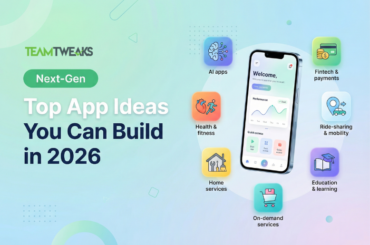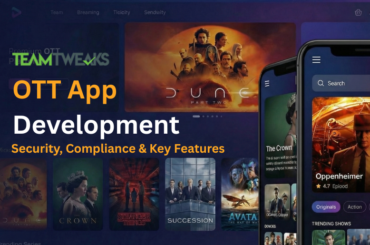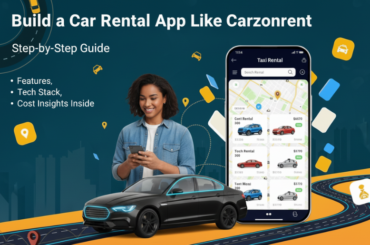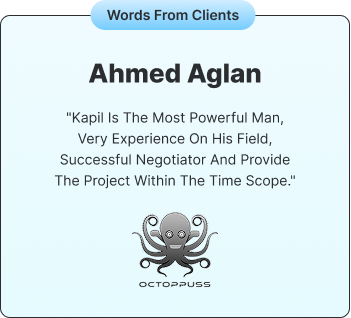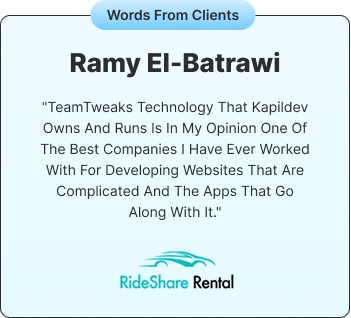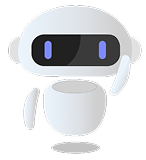The Internet of Things, or IoT, is changing the way we live and work. Applications of IoT means connecting everyday things to the internet so they can send and receive data. This connection allows these things to be smarter, faster, and more helpful. Smart mobile apps use IoT technology to control and monitor devices right from our phones. This is making life easier for people and businesses everywhere.
In this blog post, we will explore how IoT is used in different industries through smart mobile app development. We will explain simple examples, benefits, and what the future holds for these technologies.
What is IoT?
Before we jump into the industries, let’s quickly understand IoT. IoT connects objects like home appliances, cars, machines, or even sensors to the internet. These connected devices can collect data, communicate with each other, and be controlled remotely via apps.
For example, a smart light bulb can be switched on or off using a mobile app. Or a wearable fitness tracker collects health data and shares it with your phone. Applications of IoT is everywhere from homes and offices to big factories and farms.
How Does IoT Work with Smart Mobile Apps?
Smart mobile apps act as the control centers for IoT devices. Through apps, users can.
- Monitor real time data from devices
- Control device functions remotely
- Get alerts or notifications for any issues
- Analyze data to make decisions
Developing smart mobile apps that connect with IoT devices involves:
- Device connectivity through Wi-Fi, Bluetooth, or other networks
- Data collection and transmission
- User friendly app interface to manage devices
- Cloud storage and data processing
These apps give users easy access to control and monitor their devices anytime, anywhere.
Benefits of IoT in Mobile Apps for Different Industries
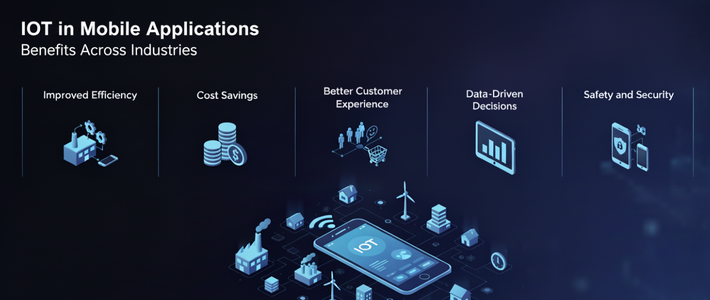
- Improved Efficiency: Automating tasks saves time and reduces errors.
- Cost Savings: Predictive maintenance avoids costly repairs.
- Better Customer Experience: Personalized services and faster responses.
- Data-Driven Decisions: Real time data helps improve operations.
- Safety and Security: Monitoring systems reduce risks and protect assets.
Applications of IoT Across Industries in Mobile App Development
The Internet of Things (IoT) is transforming mobile app development across many industries. By connecting devices, sensors, and systems to apps, businesses can offer smarter, faster, and more personalized services. From tracking deliveries in logistics to monitoring patient health in healthcare, IoT makes apps more useful and responsive. It improves decision-making with real time data, automates routine tasks, and enhances user experiences. As more industries adopt Applications of IoT, mobile apps are becoming essential tools for managing operations and serving customers better. Now let’s look at how these benefits apply to specific industries.
Healthcare Industry – IoT in Healthcare App Development

IoT in healthcare helps doctors and patients manage health better. Mobile apps connect with devices like heart rate monitors, glucose sensors, and fitness bands. These apps collect real time health data and send alerts for any problems.
For example, a patient with a wearable blood pressure monitor can share data directly with their doctor through an app. Emergency alerts can notify caregivers if health readings cross dangerous limits. IoT apps also help manage medicines, schedule appointments, and track hospital equipment. Applications of IoT is transforming healthcare by making it more personal, efficient, and accessible.
Applications in Healthcare
- Remote Patient Monitoring: Wearable devices monitor heart rate, blood pressure, glucose levels, and send data to doctors via healthcare mobile apps.
- Smart Medical Devices: Connected inhalers, insulin pumps, and ECG machines improve treatment accuracy.
- Emergency Alerts: Apps can notify doctors or family members in case of health emergencies.
- Medication Management: IoT-enabled pill dispensers remind patients to take medicines on time.
- Hospital Asset Tracking: Tracking wheelchairs, beds, and equipment via IoT to improve hospital operations.
Benefits
- Patients get continuous care without frequent hospital visits.
- Doctors can monitor multiple patients remotely.
- Faster response to emergencies saves lives.
- Improved treatment adherence.
Example
An app like Fitbit connects with wearable devices to track health data and share it with users and doctors.
Logistics and Transportation – Applications of IoT in Delivery & Fleet Apps

IoT makes fleet management smarter with GPS tracking, fuel monitoring, and driver behavior analysis. Delivery companies use apps connected to sensors on vehicles to provide real time shipment tracking.
IoT also helps in route optimization to avoid traffic and save fuel. Vehicle maintenance can be scheduled based on sensor data to avoid breakdowns. Applications of IoT improves the movement of goods and people by providing real time tracking and smart management.
Applications in Transportation
- Fleet Management: Track vehicle location, fuel consumption, and driver behavior.
- Cargo Monitoring: Sensors monitor temperature, humidity, and shock during shipping.
- Traffic Management: IoT collects data to reduce congestion and optimize routes.
- Vehicle Maintenance: Predictive alerts for vehicle servicing.
- Smart Parking: Apps guide drivers to available parking spots.
Benefits
- Reduces delivery delays.
- Improves vehicle and cargo safety.
- Lowers fuel and maintenance costs.
- Enhances customer satisfaction.
Example
Logistics companies use apps connected with GPS trackers to provide live updates on shipment status.
Agriculture Industry – Applications of IoT in Smart Farming Apps

Farmers use IoT apps to monitor soil moisture, temperature, and weather. Sensors in the field send data to mobile apps that automate irrigation and pesticide application only when needed.
Drones and sensors help track crop health and detect pests early. Livestock tracking apps monitor animal location and health. IoT helps farmers grow crops efficiently and sustainably.
Applications in Agriculture
- Smart Irrigation: Sensors detect soil moisture and control watering through mobile apps.
- Crop Monitoring: Drones and sensors monitor plant health and pest presence.
- Livestock Tracking: GPS collars track animal location and health.
- Weather Forecasting: Applications of IoT devices collect data to predict weather and avoid crop damage.
- Automated Machinery: Smart tractors and harvesters controlled via mobile apps.
Benefits
- Saves water and energy by watering only when needed.
- Increases crop yield by timely action.
- Reduces manual labor.
- Protects animals and crops better.
Example
Farmers use apps that connect with soil sensors to control irrigation systems remotely.
Smart Homes – Applications of IoT in Home Automation Apps

IoT apps allow homeowners to control lighting, heating, and security systems remotely. Smart locks, cameras, and sensors connect with mobile apps to monitor homes in real time.
Real estate developers use IoT to manage building systems like elevators, energy use, and security through apps. IoT makes homes more comfortable, secure, and energy efficient.
Applications in Smart Homes
- Smart Lighting: Control lights remotely or automate with sensors.
- Security Systems: Cameras, motion sensors, and alarms connected to mobile apps.
- Thermostats: Adjust home temperature using smart thermostats.
- Appliance Control: Turn on/off refrigerators, washing machines, and ovens remotely.
- Voice Control: Integrate with smart assistants like Alexa and Google Home.
Benefits
- Saves energy by controlling devices.
- Improves home security.
- Adds convenience with automation.
- Enables remote monitoring.
Example
Apps like Google Home or Samsung SmartThings allow users to manage multiple smart devices.
Water & Environment – Applications of IoT in Water Management App Development
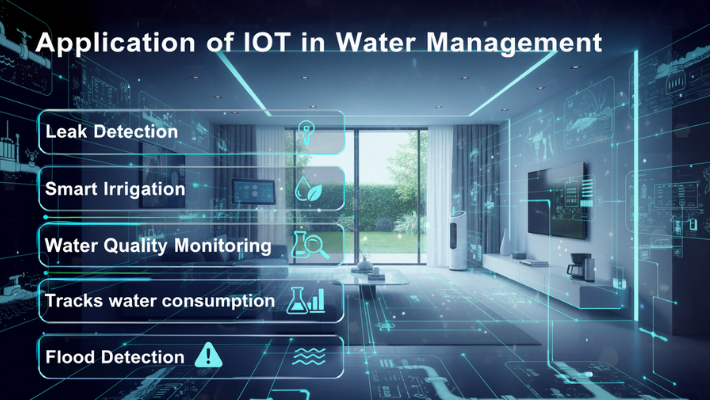
IoT sensors detect leaks in pipelines and monitor water quality. smart water management using iot app collect data to control irrigation and manage water resources. Flood detection systems warn authorities through IoT-connected apps to prevent damage. IoT supports sustainable water use and reduces waste.
Applications in Water Management
- Leak Detection: Sensors detect pipeline leaks early.
- Smart Irrigation: Automates watering based on weather and soil data.
- Water Quality Monitoring: Detects contamination in real time.
- Usage Analytics: Tracks water consumption for households and industries.
- Flood Detection: Monitors water levels to warn about floods.
Benefits
- Saves water and reduces damage.
- Ensures clean and safe water supply.
- Helps manage water resources better.
- Protects infrastructure and environment.
Example
Water management apps send alerts when leaks are detected in city pipelines.
Automotive Industry – IoT in Connected Car Apps

Connected car apps let users monitor vehicle health, control locks, and start engines remotely. Telematics systems provide real time data on fuel use and driving habits.
IoT powers autonomous driving features and enhances in-car entertainment by connecting smartphones. IoT is shaping the future of connected and autonomous vehicles.
Applications in Automotive
- Vehicle Telematics: Track vehicle health, location, and driving habits.
- Remote Diagnostics: Diagnose problems without visiting a garage.
- Connected Cars: Apps control car functions like locking/unlocking doors.
- Autonomous Driving: IoT sensors guide self driving cars.
- Infotainment Systems: Connect smartphones with vehicle entertainment.
Benefits
- Improves vehicle safety and maintenance.
- Enhances driver convenience.
- Reduces accidents with real time alerts.
- Enables new services like ride-sharing.
Example
Tesla’s mobile app allows owners to monitor and control their cars remotely.
Hospitality Industry – IoT in Hotel Management Apps

Hotels use Applications of IoT for room automation, allowing guests to control temperature, lighting, and entertainment via their phones. Inventory and resource management improve with IoT tracking supplies and equipment. Security systems monitor hotel premises in real time.IoT improves guest experiences and hotel operations.
Applications in Hospitality
- Smart Room Controls: Guests control lighting, temperature, and entertainment via app.
- Inventory Management: Track hotel supplies and food stock.
- Security: IoT cameras and smart locks enhance safety.
- Personalized Services: Use data to offer tailored recommendations.
- Energy Efficiency: Automatically adjust room conditions when unoccupied.
Benefits
- Increases guest satisfaction.
- Saves operational costs.
- Enhances security.
- Improves resource management.
Example
Hotels offer apps for guests to check-in, control room settings, and order services.
Energy & Utilities – IoT in Power Management Apps

Smart meters connect to apps to help users monitor electricity or gas consumption. Utilities use Applications of IoT to manage smart grids and detect faults quickly. Renewable energy systems like solar panels can be monitored and controlled via mobile apps. IoT helps to manage energy production, distribution, and consumption efficiently.
Applications in Energy Sector
- Smart Grids: Real time monitoring and control of power supply.
- Energy Metering: Smart meters track electricity, water, or gas use.
- Renewable Energy Monitoring: Manage solar panels and wind turbines.
- Home Energy Management: Control lighting and appliances for energy saving.
- Fault Detection: Quickly identify and fix faults in the network.
Benefits
- Improves energy efficiency.
- Reduces costs and wastage.
- Supports renewable energy integration.
- Enhances grid reliability.
Example
Smart meter apps let users monitor and control their electricity consumption.
Education Sector – IoT in eLearning App Development

IoT creates smart classrooms where devices adjust lighting and temperature automatically. Apps track student attendance using RFID or biometrics. Learning apps use IoT data to personalize lessons and monitor student progress. Campus security improves with connected cameras and sensors. IoT is creating interactive and personalized learning experiences.
Applications in Education
- Smart Classrooms: Sensors adjust lighting and temperature.
- Attendance Tracking: Use RFID tags for student attendance.
- Learning Analytics: Collect data on student progress and engagement.
- Virtual Labs: IoT devices enable remote experiments.
- Safety Monitoring: Monitor campus security with connected cameras.
Benefits
- Improves the learning environment.
- Helps teachers track and support students.
- Enhances safety on campus.
- Supports remote and blended learning.
Example
Apps that let teachers monitor student attendance and performance in real time.
Construction Industry – IoT in Site Management Apps
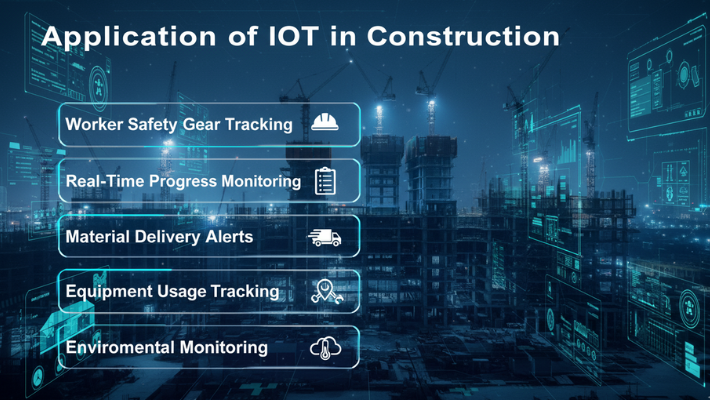
Construction sites use Applications of IoT to track equipment, materials, and workers’ safety. Sensors detect hazardous conditions like gas leaks or structural instability.Project managers monitor progress and resource use in real time to improve efficiency. IoT keeps construction sites safe and on schedule.
Applications in Construction
- Worker Safety Gear Tracking: Detects if workers wear helmets and gear.
- Real Time Progress Monitoring: Apps show live status updates.
- Material Delivery Alerts: Get notified when items arrive.
- Equipment Usage Tracking: Monitor machine hours and usage.
- Environmental Monitoring: Check dust, noise, and temperature.
Benefits
- Reduces accidents.
- Prevents project delays.
- Controls costs.
- Improves visibility.
Example
A manager receives an app alert when a crane enters a restricted zone.
Finance & Banking – Applications of IoT in Fintech App Development
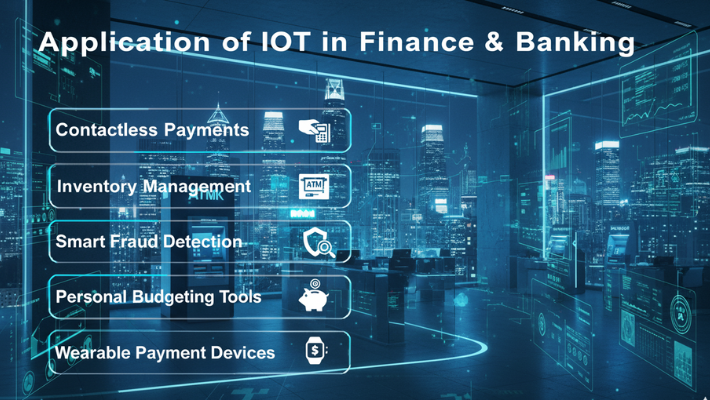
IoT devices like smart cards and wearables enable secure payments. Banks use IoT apps for real time fraud detection and customer behavior analysis. Smart ATMs and connected branches improve service efficiency. IoT supports safe and fast financial transactions.
Applications in Finance
- Contactless Payments: Tap cards and phones to pay.
- ATM Monitoring: Track machine use and refill alerts.
- Smart Fraud Detection: Apps spot unusual spending.
- Personal Budgeting Tools: Help users manage money.
- Wearable Payment Devices: Pay using smartwatches and rings.
Benefits
- Reduces fraud.
- Offers faster payments.
- Helps with money management.
- Enhances customer trust.
Example
A bank app blocks suspicious transactions and sends real-time alerts.
Sports & Fitness – IoT in Fitness App Development
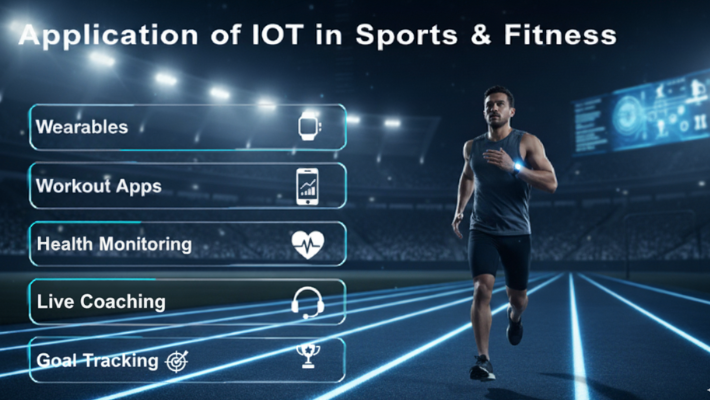
Fitness apps connect with wearables to track heart rate, steps, calories, and sleep. Users get personalized workout and health advice through IoT data. Sports teams use IoT for player performance monitoring and injury prevention. IoT helps people stay active and healthy.
Applications in Sports & Fitness
- Wearables: Track steps, heart rate, and calories.
- Workout Apps: Guide users through custom exercises.
- Health Monitoring: Detects sleep, blood pressure, and stress.
- Live Coaching Integration: Connect to trainers during workouts.
- Goal Tracking: Set and monitor fitness goals.
Benefits
- Encourages healthy living.
- Tracks progress easily.
- Prevents overtraining.
- Offers motivation.
Example
A fitness app adjusts daily workouts based on user sleep data.
E-commerce – Applications of IoT in E-commerce App Development

E-commerce apps integrate IoT to offer smart inventory management and personalized shopping experiences. Connected warehouses use robots and sensors to speed up order fulfillment. Applications of IoT improves the shopping experience and delivery.
Applications in E-commerce
- Smart Inventory: Know what products are in stock.
- Warehouse Automation: Robots and sensors speed up packing.
- Order Tracking: Customers get real time delivery updates.
- Connected Devices Shopping: Shop via smart fridges or voice.
- Customer Insights: Apps offer products based on behavior.
Benefits
- Faster order fulfillment.
- Better customer service.
- Accurate inventory.
- More personalized shopping.
Example
A smart fridge sends alerts to reorder groceries via an app.
Tourism & Travel – IoT in Travel App Development

Travel apps use IoT to provide real time information on flights, weather, and local services. Smart luggage tracking and connected hotel rooms improve traveler convenience. IoT makes travel smarter, safer, and more personalized.
Applications in Travel
- Smart Luggage Tracking: Apps help track luggage in real time at airports or hotels.
- Location-Based Services: Apps suggest restaurants, hotels, or tourist spots nearby.
- Connected Navigation Systems: Apps provide real time traffic updates and alternate routes.
- Remote Check-In and Access: Travelers check in to hotels or flights using mobile apps.
- Wearable Integration: Smartwatches help with translations, itineraries, and booking alerts.
Benefits
- Enhances travel experience.
- Saves time and effort.
- Improves safety and security.
- Offers customized recommendations.
Example
A traveler gets automatic alerts on their app when near a tourist attraction or if their luggage changes location.
Waste Management & Recycling – IoT in Waste Management App Development

IoT sensors in smart bins detect fill levels and notify collection services via apps. Route optimization for garbage trucks reduces fuel use and emissions. IoT helps optimize collection and disposal of waste.
Applications in Waste Management
- Smart Bins: Sensors notify when bins are full.
- Route Optimization: Track garbage trucks for efficient collection routes.
- Recycling Monitoring: Monitor recyclable waste levels.
- Illegal Dumping Detection: Sensors alert authorities about unauthorized dumping.
- Data Analytics: Use data to improve waste policies.
Benefits
- Reduces costs and emissions.
- Improves cleanliness and hygiene.
- Enhances recycling rates.
- Supports smart city initiatives.
Example
City authorities use apps linked to smart bins for timely waste collection.
Team Tweaks – Your Trusted Partner For Smart Mobile App Development
At Team Tweaks, we make smart and reliable mobile apps for all types of businesses. Whether you are in healthcare, retail, education, logistics, or any other industry – we can help you build a powerful app that connects smart devices and gives you real time data.
Team Tweaks is a mobile app development company in Chennai, India. We have over 12+ years of experience in building custom mobile apps for clients around the world.
Our expert team creates secure, easy to use, and scalable IoT apps that fit your business goals. We use the latest technologies to make sure your app works fast, stays safe, and helps you grow.
Whether you need a water management app, a smart home system, or a connected vehicle solution. We can design and develop the perfect app for you.
Why Choose Team Tweaks?
- Experienced app developers
- Custom solutions for every industry
- Full support from planning to launch
- Budget friendly and future ready
- Smooth and user friendly designs
Contact Team Tweaks today to turn your smart IoT app idea into reality. Let’s build the future together – one connected app at a time.
Final Thoughts
There’s no doubt that IoT is bringing major changes to industries around the world. While it may take time for complete global adoption, the shift has already begun. In the near future, we can expect to see smart classrooms, safer food and travel systems, fully digital payments, and much more. If you’re planning to bring IoT features into your mobile app, it’s the right time to get started. Reach out to one of the top mobile app development company in India. The expert team at Team Tweaks is ready to help just a call away from your next big idea.

